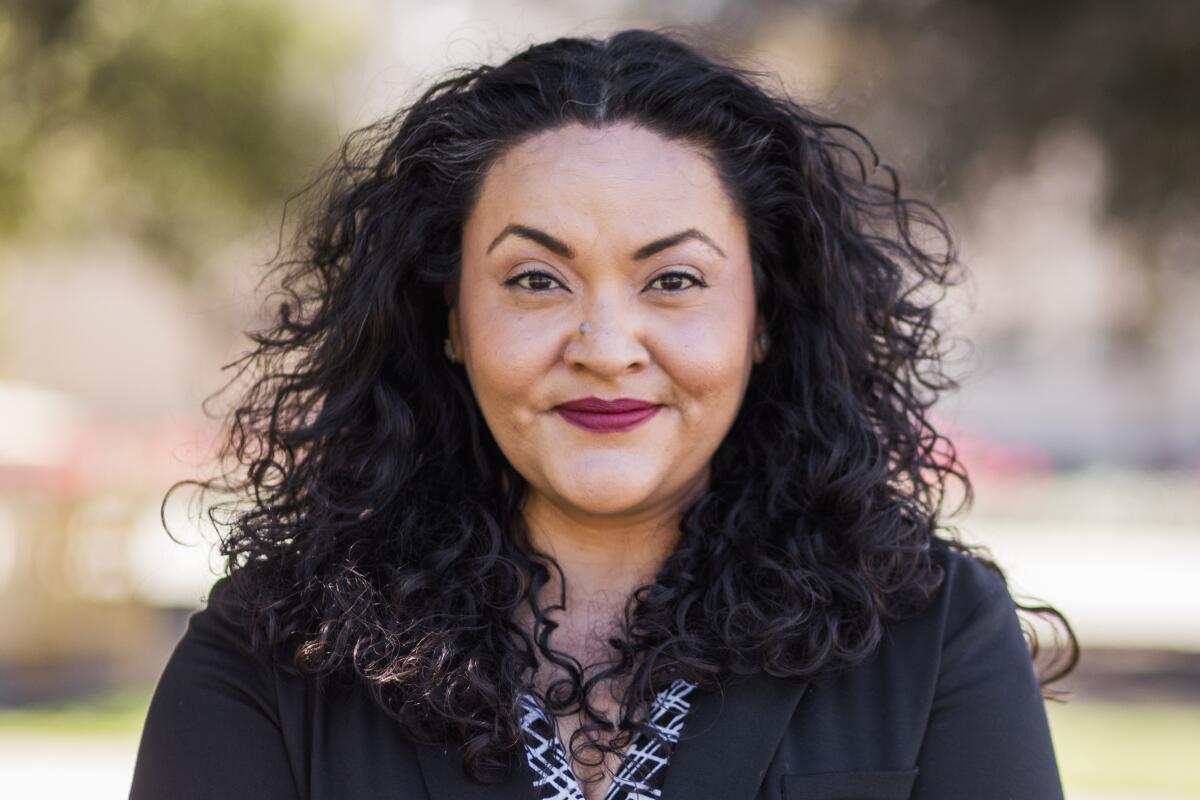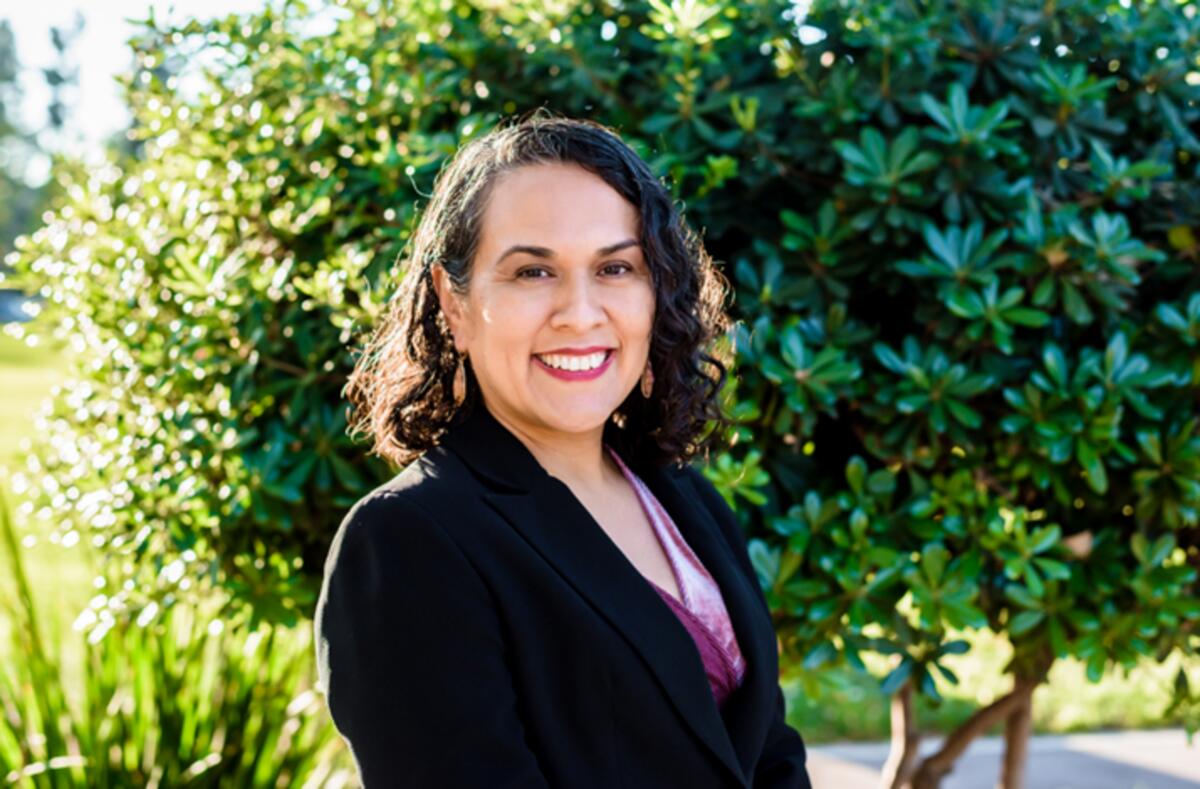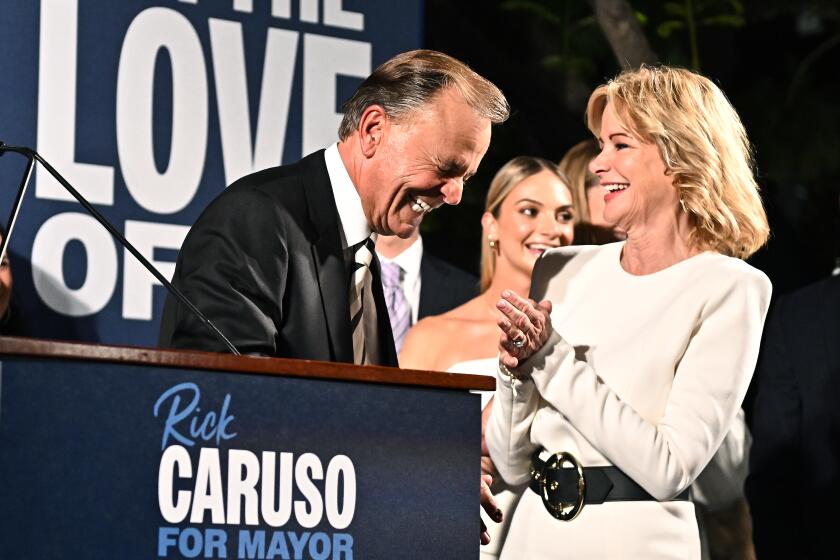Melvoin poised to win L.A. school board seat; Gonez in runoff; Rivas, Brenes battle for open seat

- Share via
One-term incumbent Nick Melvoin appears to have been reelected to the Los Angeles Board of Education, but school board President Kelly Gonez seems headed to a runoff to keep her seat. The open seat in District 2 will go to a runoff between Rocio Rivas and Maria Brenes.
Melvoin’s win in District 4 was widely anticipated, especially given the financial advantage he had over his opponents, but the other two outcomes were less expected. In the most recent tally Wednesday morning, Melvoin had 55% of the vote. To win outright and avoid a November runoff he needed just over 50%. In second place among three candidates was teacher Tracey Schroeder with 29%. Parent Gentille Barkhordarian pulled in 16%.
For the record:
3:47 p.m. June 9, 2022An earlier version of this post misspelled a school board candidate’s last name. The correct name is: Gentille Barkhordarian.
While many votes remain to be counted, it would be extremely unlikely for Melvoin to drop below 50%.
In District 6, Gonez had the major endorsements and a funding advantage — and she finished well in front — but could not cross the 50% threshold needed to win outright in Tuesday’s primary for the nonpartisan position. She tallied 45% compared to 31% for teacher Marvin Rodriguez and 24% for school police Sgt. Jess Arana. Gonez and Rodriguez will face each other in the runoff.
Although Rivas and Brenes were expected to reach a runoff in District 2, the order of finish surprised some. Rivas was ahead of Brenes even though Brenes had a funding advantage. That race is considered strongly competitive. Rivas had 38%; Brenes 31%. In third place was substitute teacher Miguel Angel Segura at 21%, followed by parent Erica Vilardi-Espinosa at 9%.
District 2 covers downtown L.A. and adjacent neighborhoods while also extending north and east of downtown.
The winners will face daunting and unusual challenges in governing the L.A. Unified School District as part of the seven-member school board. In the short term, the nation’s second-largest school system will have unprecedented financial resources to help with the unprecedented tasks of academic and emotional recovery from the COVID-19 pandemic.
But declining enrollment, the end of one-time pandemic relief and a widely predicted economic downturn pose long-term threats to the stability of academic programs, expanded psychological support, high-quality employee health benefits and jobs.
Despite the high stakes, the campaigns were less vitriolic than in the recent past, and one major player — the California Charter Schools Assn. — held its direct fire, relying on other donors to back favored candidates.
Charters are privately operated public schools, mostly nonunion, that compete for students with traditional, district-operated schools. For years, supporters and opponents have done battle over the rapid growth of charters as well as their legal right to claim available classroom space on district-owned campuses. This clash carried over into record spending and mudslinging in school board races fueled by charter advocates on one side and the teachers union on the other.
Such conflicts, however, receded somewhat as all public schools contended with the common enemy of the pandemic. And the reality of declining enrollment means that new charters would run the risk of taking students from existing charters.

District 2
The toned-down conflict over charters carried over into the primary. In previous elections, charter advocates and their allies were the biggest spenders, but for the open seat in District 2, the independent campaigns were marshaled by two opposing unions — that are, for the most part, friendly rivals.
United Teachers Los Angeles launched an independent campaign on behalf of Rivas, spending more than $772,000 through early Tuesday. In contrast, Rivas’ own campaign had raised $54,269.
The union putting its muscle behind Brenes is Local 99 of Service Employees International Union, which represents the greatest number of nonteaching employees, including bus drivers, teacher aides, custodians, grounds workers and cafeteria workers. Local 99 is responsible for virtually all of a nearly $900,000 independent campaign. Brenes’ own campaign had raised an additional $291,705, according to campaign reports through June 1.
More on the primary
In the entire field, Rivas, a senior adviser to current board member Jackie Goldberg, was the candidate who spoke most forcefully about regulating and containing charter schools. In an interview, Brenes more or less pushed aside the topic of charters, saying her focus needed to be on improving and supporting the schools under direct district management.
Brenes, the founder and director of the nonprofit InnerCity Struggle, is the candidate who identifies most closely with departing board member Monica Garcia, who could not run again because of term limits. Rivas is the candidate most critical of Garcia.
Trailing in resources and votes were Vilardi-Espinoza, who had support from law enforcement unions, and Miguel Angel Segura, who had highlighted that he was the only teacher on the ballot in District 2. That ballot designation probably helped him, although not enough to make the runoff.
Districts 4 and 6
The uneven financial playing field was most apparent in District 4, which stretches to the Westside from Hollywood and up into part of the west San Fernando Valley.
Melvoin’s own campaign raised close to $550,000 as of early Tuesday. In addition, retired businessman Bill Bloomfield joined the fray again, spending more than $1.6 million for an independent campaign on Melvoin’s behalf. Bloomfield said he considers himself an education advocate rather than a charter advocate, but the education and community leaders he relies on for political advice are either pro-charter or at least charter friendly. Bloomfield’s spending included negative ads targeting Melvoin’s opponents: more than $150,000 against Schroeder and more than $21,000 against Barkhordarian.
In contrast, both Schroeder and Barkhordarian reported having raised no money whatsoever. Bloomfield’s spending against Melvoin’s opponents was out of apparent concern that Schroeder’s ballot designation — as a teacher — could attract votes, as could Barkhordarian’s designation as a parent.
Bloomfield has used this strategy before, paying for negative ads against a teacher with few resources who ran in District 7 two years ago. In that race, his preferred candidate, Tanya Ortiz Frankly, ultimately prevailed.
Notably missing from the District 4 contest was the teachers union, which, in effect, conceded the race to Melvoin, while not endorsing him. The one-term incumbent did win support from other major local unions.
Billionaire real estate developer Rick Caruso holds a narrow lead over U.S. Rep. Karen Bass in the race to replace Mayor Eric Garcetti.
In District 6 — in the east San Fernando Valley — school board President Gonez had the unusual advantage of being endorsed by both the teachers union and charter advocates. That put her challengers, Rodriguez and Arana, in a tough spot from the get-go.
But Gonez did not receive as much independent financial support as front-runners in other races. The total of such spending was just over $48,000 — with contributions from Local 99, the teachers union and Bloomfield. Gonez’s own campaign raised more than $285,000, substantially more than her opponents. Yet her opponents did raise at least modest amounts and they were able to do enough to keep Gonez from winning outright. Gonez remains a favorite to win in November.
More to Read
Sign up for Essential California
The most important California stories and recommendations in your inbox every morning.
You may occasionally receive promotional content from the Los Angeles Times.















